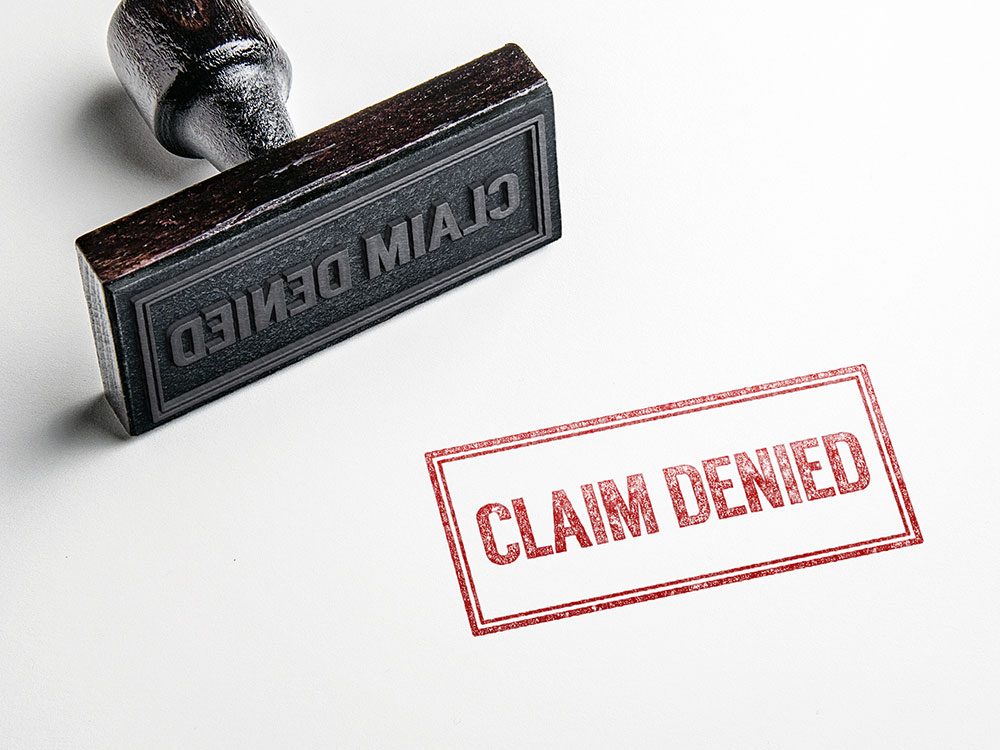
Was your car insurance claim denied? Here are the likely reasons why
If you want to drive a vehicle on public roads in Canada, you’ll first be required to purchase appropriate car insurance coverage. In return for paying insurance premiums, drivers tend to expect their insurers to have their backs when it comes to approving claims. The reality, however, is that insurance companies may be fully within their rights to deny your car insurance claim in certain scenarios, including the following…

Non-payment of your premium can be grounds for denying a car insurance claim
It’s very important to pay your car insurance premiums on time, as failure to make payment can result in increased premiums, a poor insurance and credit history, additional fees or the cancellation of your contract altogether. If you’re involved in a collision but your insurance premium was unpaid, an insurance provider is fully within its rights to deny your car insurance claim, regardless of whether or not the missed payment was an oversight on your part. To reduce the risk of missed payments, ensure that your insurance provider always has your current address and banking information on file—especially if you’re paying premiums in monthly installments.
Tightening your purse strings? Find out how to lower your car insurance premium.

Avoidability is grounds for denying a car insurance claim
Insurance providers are entitled to deny your claim if they have reason to believe that the accident could have been avoided or that you did something that could have caused it. Examples of this include reckless driving or racing, being under the influence of drugs or alcohol at the time of the collision, or allowing unauthorized or unlicensed users drive your car. In certain provinces, failure to equip your vehicle with mandatory safety equipment such as winter tires (in Quebec) may also fall in the “preventable” incident category, resulting in your claim being denied.
Here’s exactly when you should switch to winter tires.

Providing misleading information or failing to disclose could result in your car insurance claim being denied
It’s important to keep your insurance provider updated with your personal information, as insurers can deny your claim if they have reason to believe that you misinformed them or failed to disclose something that would have affected either the price of your premiums or your eligibility for coverage. One of the most common examples of “failure to disclose” is providing an incorrect address. While the reason for this could be that you moved since you first took out your car insurance policy, in the eyes of an insurer, you could have also provided an alternative address to obtain a discount on your premiums. Additional disclosures that should be made when signing up for insurance coverage include modifications made to your vehicle, previous damage, any driving or accident claim history that may have an impact on your quote, as well as the number of people of legal driving age who live in your household or have access to your car.
Check out the world’s most dangerous roads.

Commercial use can be grounds for denying your car insurance claim
When opening a new insurance policy, your insurer will likely ask you for the number of kilometres you anticipate driving in a year, as well as the distance of your daily commute to and from work. In the event that you told the insurer that your vehicle would be used solely for personal use, but have been using it for commercial use on a regular basis, there is a high likelihood that you will have your claim denied in the event of a collision. The rationale is that “commercial use” vehicles are used on a more frequent basis, and thus have a higher probability of getting involved in a collision. If you would like to continue using your personal vehicle for commercial use, you might be required to get a “business use” policy.
You might also have your car insurance claim denied if you’ve been using your vehicle for a ride-sharing program like Uber, which is not covered by most standard insurance contracts. Fortunately, a number of insurance providers including Intact and belairdirect now offer insurance coverage for those who would like to use their vehicle for ride-sharing purposes.
Check out the 13 things you should never do to your car.

Your car insurance claim can be denied if it a non-authorized driver was behind the wheel
It’s important to disclose the names of any individuals above the driving age living in your household, as insurance companies assume that they have ready access to your car. If these individuals have minimal driving experience or a poor driving history, you might have to sign a waiver stating that they will not be allowed to drive your car to prevent your premiums from skyrocketing. Failure to disclose drivers within your household can leave you liable if they get into an accident using your vehicle, as the inference in the eyes of the insurer is that you allowed them to drive.
Here are five car insurance myths you need to stop believing.

If you drove with a suspended driver’s licence, your car insurance claim could be denied
There are a number of grounds for suspending a driver’s licence, including driving under the influence of drugs or alcohol, an excessive amount of speeding tickets and reckless driving. In the event that you are involved in an accident and caught driving with a suspended driver’s licence, your insurance provider reserves the right to deny your claim and even cancel your policy altogether.
Find out which types of people are most likely to be distracted drivers.

Criminal use is grounds for denying your car insurance claim
In the event you use your vehicle for criminal activity and are involved in a collision, most insurance providers stipulate that you will not be covered. Criminal activity includes (but is not limited to) robbery and drug trafficking.
Next, check out eight car anti-theft devices to protect your ride.